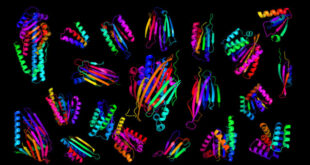A study published in the December 6, 2018 issue of the journal Scientific Reports found newborns with vitamin D deficiency had a 44% increased risk of being diagnosed with schizophrenia as adults compared to those with normal vitamin D levels.
Newborns with vitamin D deficiency have an increased risk of schizophrenia later in life. Image credit: Kai Kalhh.
Schizophrenia is a poorly understood group of brain disorders characterized by impairments in cognition, perception and affect, with a lifetime prevalence of 0.7%.
“As the developing fetus is totally reliant on the mother’s vitamin D stores, our findings suggest that ensuring pregnant women have adequate levels of vitamin D may result in the prevention of some schizophrenia cases, in a manner comparable to the role folate supplementation has played in the prevention of spina bifida,” said study lead author Professor John McGrath, a researcher at the University of Queensland in Australia and Aarhus University in Denmark.
The study, which was based on 2,602 individuals, analyzed vitamin D concentration in blood samples taken from Danish newborns between 1981 and 2000 who went on to develop schizophrenia as young adults.
The researchers compared the samples to those of people matched by sex and date of birth who had not developed schizophrenia.
“Schizophrenia is associated with many different risk factors, both genetic and environmental, but the research suggested that neonatal vitamin D deficiency could possibly account for about 8% of schizophrenia cases in Denmark,” Professor McGrath said.
“Much of the attention in schizophrenia research has been focused on modifiable factors early in life with the goal of reducing the burden of this disease.”
“Previous research identified an increased risk of schizophrenia associated with being born in winter or spring and living in a high-latitude country, such as Denmark.”
“We hypothesized that low vitamin D levels in pregnant women due to a lack of sun exposure during winter months might underlie this risk, and investigated the association between vitamin D deficiency and risk of schizophrenia.”
Although Australia had more bright sunshine compared to Denmark, vitamin D deficiency could still be found in pregnant women in Australia because of our lifestyle and sun-safe behavior.
The team now plans to conduct randomized clinical trials of vitamin D supplements in pregnant women who are vitamin D deficient, in order to examine the impact on child brain development and risk of neurodevelopmental disorders such as autism and schizophrenia.
_____
Darryl W. Eyles et al. 2018. The association between neonatal vitamin D status and risk of schizophrenia. Scientific Reports 8, article number: 17692; doi: 10.1038/s41598-018-35418-z
 #Bizwhiznetwork.com Innovation ΛI |Technology News
#Bizwhiznetwork.com Innovation ΛI |Technology News




